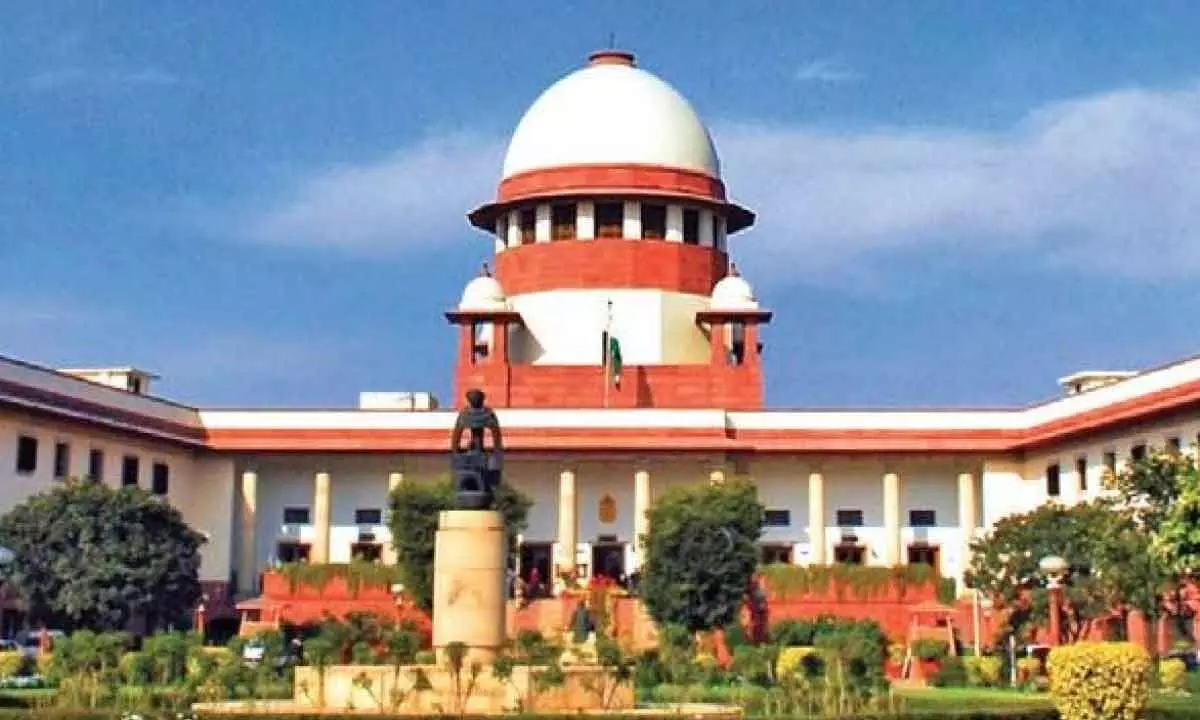Live
- Police making efforts to recover weapons disposed of by Maoists: HM
- All accused in Renukaswamy case including Darshan appear before court
- Corruption stink in BBMP, former members now in trouble with ED
- Daily Horoscope for January 11, 2025: Discover What Your Stars Hold For You Today
- Demand rises for registration of revenue plots in B’luru limits
- Youngsters will gain a lot of experience from HIL, says Navneet Kaur
- Preparations in full swing for Bangalore Air Show next month
- Concerns grow over delay in approval for nuclear power plant
- Money approved for Gangavali River silt removal: Boseraju
- HC expresses displeasure over delayed order compliance
Just In
What is exact stand, Apex court asks Centre


Supreme Court
Supreme Court on Wednesday asked the Centre to bring on record its exact stand on petitions challenging the validity of certain provisions of the Places of Worship (Special Provisions) Act 1991, and how much time will it take to file a response in the matter.
New Delhi: The Supreme Court on Wednesday asked the Centre to bring on record its exact stand on petitions challenging the validity of certain provisions of the Places of Worship (Special Provisions) Act 1991, and how much time will it take to file a response in the matter.
A bench headed by Chief Justice UU Lalit and comprising Justices S Ravindra Bhat and Ajay Rastogi asked the Solicitor-General Tushar Mehta, representing the Centre, "What is the exact stand of the central government..., how much time, and when are you going to file (its response in the matter..." Senior advocate Rakesh Dwivedi, representing one of the petitioners, submitted that the law was passed without debate and the matter involved questions of national importance. Referring to the 11 questions framed by him, Dwivedi said questions of law involve interpretation of the provisions of the Constitution and may be considered by the court in the present case.
Advocate Vrinda Grover, representing Jamiat Ulema-i-Hind, contended that Centre's response is important to take this matter forward. Mehta submitted that the reply was still under consideration and sought two weeks' time. The bench noted that the Centre's response was relevant when the validity of a legislation was challenged.
Referring to the questions framed, a counsel for one of the petitioners submitted that questions were not considered by the Supreme Court in the Ayodhya judgment which upheld the Places of Worship Act.
The bench asked Mehta about his personal view regarding the impact of the Ayodhya judgment on the challenge to the 1991 Act. The bench asked Mehta, "Was the legislation covered in the Ayodhya judgment?" Mehta said it may not be covered and sought time to file the response in the matter. After hearing arguments, the bench directed the Centre to file an affidavit on or before October 31. It listed the matter for further hearing on November 14.
On March 12, 2021, a bench headed by then Chief Justice S.A. Bobde had sought the Centre's response on the plea filed by advocate Ashwini Upadhyay challenging the validity of certain provisions of the law.
Upadhyay's plea said, "The 1991 Act was enacted in the garb of 'Public order', which is a State subject (Schedule-7, List-II, Entry-1) and 'places of pilgrimages within India' is also State subject (Schedule-7, List-II, Entry-7). So, the Centre can't enact the Law. Moreover, Article 13(2) prohibits the State to make law to take away fundamental rights but the 1991 Act takes away the rights of Hindus, Jains, Buddhist, Sikhs to restore their 'places of worship and pilgrimages', destroyed by barbaric invaders". It further added, "The Act excludes the birthplace of Lord Rama, but includes the birthplace of Lord Krishna, though both are incarnations of Lord Vishnu, the creator and equally worshiped throughout the word, hence it is arbitrary."

© 2025 Hyderabad Media House Limited/The Hans India. All rights reserved. Powered by hocalwire.com






